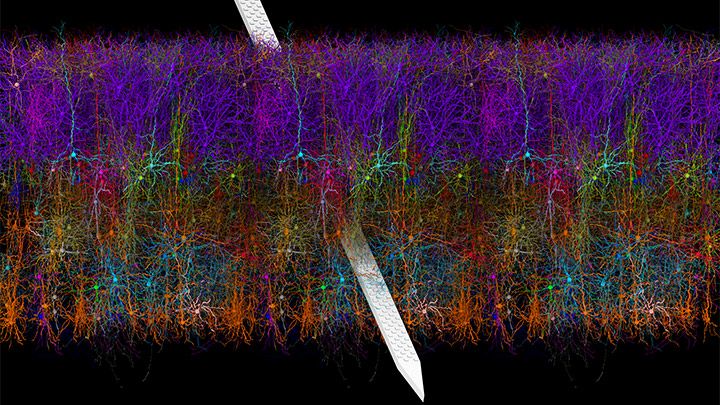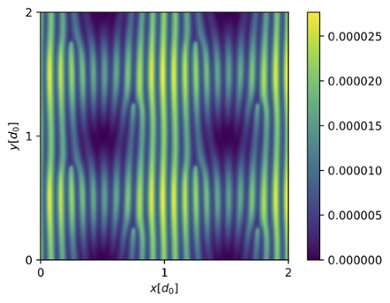Wirelessly powered microchips, which have an ~1 GHz electromagnetic transcutaneous link to an external telecom hub, can be used for multichannel in vivo neural sensing, stimulation and data acquisition.




The NIH-led Brain Research through Advancing Innovative Neurotechnologies® (BRAIN) Initiative continues to teach us about the world’s most sophisticated computer: the human brain. This striking image offers a spectacular case in point, thanks to a new tool called Visual Neuronal Dynamics (VND).
VND is not a camera. It is a powerful software program that can display, animate, and analyze models of neurons and their connections, or networks, using 3D graphics. What you’re seeing in this colorful image is a strip of mouse primary visual cortex, the area in the brain where incoming sensory information gets processed into vision.
This strip contains more than 230,000 neurons of 17 different cell types. Long and spindly excitatory neurons that point upward (purple, blue, red, orange) are intermingled with short and stubby inhibitory neurons (green, cyan, magenta). Slicing through the neuronal landscape is a neuropixels probe (silver): a tiny flexible silicon detector that can record brain activity in awake animals [1].

This axion insulating state was realized, Bansil says, by combining certain metals and observing their magnetoelectric response. In this case, researchers used a solid state chip composed of manganese bismuth telluride, which were adhered together in two-dimensional layers, to measure the resulting electric and magnetic properties.
Researchers note that such a finding has implications for a range of technologies, including sensors, switches, computers, and memory storage devices, among many others. The “storage, transportation, and manipulation of magnetic data could become much faster, more robust, and energy-efficient” if scientists can integrate these new topological materials into future devices, the researchers write.
“It’s like discovering a new element,” Bansil says. “And we know there’s going to be all sorts of interesting applications for this.”

Majoranas particles found.
Majorana particles have been getting bad publicity: a claimed discovery in ultracold nanowires had to be retracted. Now Leiden physicists open up a new door to detecting Majoranas in a different experimental system, the Fu-Kane heterostructure, they announce in Physical Review Letters.
Majorana particles are quasiparticles: collective movements of particles (electrons in this case) which behave as single particles. If detected in real life, they could be used to build stable quantum computers.
“Majoranas are quantum mechanical superpositions,” explains Gal Lemut. This superposition, a special kind of combination, comprises an electron and a hole (a place in a crystal where an electron is missing.

Since receiving a $25 million grant in 2,019 to become the first National Science Foundation (NSF) Quantum Foundry, UC Santa Barbara researchers affiliated with the foundry have been working to develop materials that can enable quantum information-based technologies for such applications as quantum computing, communications, sensing, and simulation.
They may have done it.
In a new paper, published in the journal Nature Materials, foundry co-director and UCSB materials professor Stephen Wilson and multiple co-authors, including key collaborators at Princeton University, study a new material developed in the Quantum Foundry as a candidate superconductor—a material in which electrical resistance disappears and magnetic fields are expelled—that could be useful in future quantum computation.

‘Some forms of encryption used today can be broken by future large-scale quantum computers, which drives a search for alternatives’
“Some forms of encryption used today can be broken by future large-scale quantum computers, which also drives a search for alternatives,” Ling said.
In a canned statement, the NUS said AWS will gain access to the university’s National Quantum-Safe Network, a vendor-neutral platform for developing technology and integrating some of it into local fiber networks.
“The understanding that we are using quantum communications technology to support experiments using existing fiber is correct,” AWS ASEAN managing director Tan Lee Chew told The Register.

No, it’s not forbidden to innovate, quite the opposite, but it’s always risky to do something different from what people are used to. Risk is the middle name of the bold, the builders of the future. Those who constantly face resistance from skeptics. Those who fail eight times and get up nine.
(Credit: Adobe Stock)
Fernando Pessoa’s “First you find it strange. Then you can’t get enough of it.” contained intolerable toxicity levels for Salazar’s Estado Novo (Portugal). When the level of difference increases, censorship follows. You can’t censor censorship (or can you?) when, deep down, it’s a matter of fear of difference. Yes, it’s fear! Fear of accepting/facing the unknown. Fear of change.
What do I mean by this? Well, I may seem weird or strange with the ideas and actions I take in life, but within my weirdness, there is a kind of “Eye of Agamotto” (sometimes being a curse for me)… What I see is authentic and vivid. Sooner or later, that future I glimpse passes into this reality.

